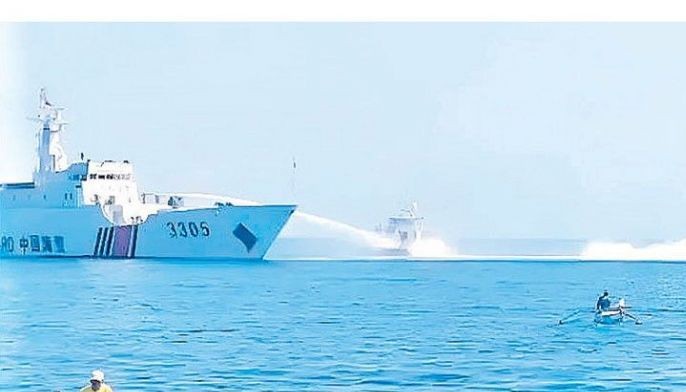MANILA, Philippines — The National Task Force for West Philippine Sea (NTF-WPS) yesterday demanded that China remove its vessels from Bajo de Masinloc (Panatag Shoal) where they had interrupted a humanitarian mission of the Bureau of Fisheries and Aquatic Resources (BFAR) for Filipino fishermen.
“We firmly insist that these Chinese vessels leave Bajo de Masinloc immediately,” the NTF-WPS said, as it condemned attempts by the Chinese coast guard and militia to stop – using water cannons – the BFAR from distributing grocery packs and oil subsidy to over 30 fisherfolk near Bajo de Masinloc early yesterday.
“We demand that the Chinese government take immediate action to halt these aggressive activities and uphold the principles of international law and desist from actions that would infringe on Philippine sovereignty and endanger the lives and livelihood of Filipino fishermen who have traditionally fished in the area,” the NTF-WPS said.
The water cannon blast “left significant damage” to the communications and navigation equipment of BFAR vessel Datu Tamblot. The two other BFAR vessels involved in the incident were Datu Sanday and Datu Bankaw.
The mission continued as of press time despite Chinese harassment.
It added it remains “committed to protecting the sovereignty and territorial integrity of the Philippines in the West Philippine Sea.”
“To prevent the distribution of humanitarian support is not only illegal but also inhumane,” the task force said.
Meanwhile, a geopolitical analyst is urging the government to continue working with like-minded states in addressing concerns in the West Philippine Sea in 2024.
Stratbase ADR Institute president Dindo Manhit made the statement during a forum entitled, “Fostering Cooperation in the Indo-Pacific Towards 2024,” organized by the Stratbase ADR Institute on Nov. 28.
Manhit said that this year saw like-minded states repeatedly express their support for the Philippines’ arbitral victory.
“The international community is an advocate of promoting peace and stability in the region… Our united front allows us to remain firm against aggressive and coercive acts disrupting our peace,” Manhit said.
“As we close 2023, the Philippines should be in a better position to confront the risks in the West Philippine Sea by building on its capabilities and ironing out interoperability with like-minded states. In the same manner, it should continue to involve the public and expose the coercive tactics employed by aggressive states,” he added.
Manhit said the Philippines became a focal point of geopolitical tension in the Indo-Pacific this year, as China continued to conduct gray zone operations in key areas of the West Philippine Sea.
These include the intimidation of civilian Filipino fishing vessels, conducting a series of water cannon incidents, damaging coral reefs and spreading disinformation.
He also warned of the emergence of new security challenges in 2024.
“Cybersecurity will be at the center of foreign relations and military strategies in the coming months. This is gaining more traction as more people experience cyber risks in their daily use of the internet. As we confront existing and evolving risks, the national interest must remain paramount in our policy implementation,” he explained.
“As our Institute continuously advocates, our interconnected and interdependent futures hinge on fostering collaborative efforts and sustainable partnerships among nations while ensuring that our shared goals align with the evolving needs of the Philippine society. Let us continue to do so in the coming years,” he said.
Moya Collett, Australian deputy head of mission to the Philippines, said these are consequential times for the Indo-Pacific region.
She identified recent significant developments in Philippine-Australia relations, most notably the elevation of the two countries’ bilateral partnership to a strategic partnership during the visit of Australian Prime Minister Anthony Albanese to Manila in September this year.
“The key focus is maritime cooperation,” said Collett, adding that Australia is also a maritime country that depends on a region governed by accepted rules and norms.
“We want a peaceful South China Sea where laws are respected and waterways are open for trade,” she said. “Adherence to the United Nations Convention on the Law of the Sea is vital to the region.”
South Korean Ambassador Lee Sang Hwa also emphasized the importance of a stable maritime architecture for both the Philippines and South Korea.
“Cementing rules-based order in this region is key to taking a leap forward for both Korea and the Philippines. As the Philippines seeks to become an upper middle-income country soon and Korea aspires to be included in the G7+ group, securing a stable and thriving maritime architecture has become vital for both countries,” the Korean ambassador said.
“Our shared destiny is intrinsically linked to our ability to harness the potential benefits of the seas and to overcome its challenges. The geostrategic center of gravity shift to the Indo-Pacific, we firmly believe that a free and open Indo-Pacific is the key to thriving, connected and stable regional environment,” he also explained.
PCG commandant Adm. Ronnie Gil Gavan said that maritime cooperation among countries is not limited to capacity and equipment, and that a country can only win if it is supported by a strong industrial base.
“Any armed service is a function of the economy,” he said.
The PCG is open to partnerships with anyone as it pursues its mission to help achieve peace based on rules, Gavan said, adding that they are reaching out to friends and partners to develop the local shipbuilding industry.
“We can only win if we are supported by a strong industrial base,” Gavan added.
He enumerated the PCG’s three main pursuits: maritime domain awareness and response including law enforcement, coastal state administration and international cooperation and engagement.


